Library
All resources
1681 – 1700 of 2424 results

Cash/Food. A Comparative analysis of the effectiveness of food assistance modalities in refugee settlements
Report
A comparative analysis of the effectiveness of food and cash assistance modalities for household food security in refugee settlements

Market Analysis and Outcome/Impact Measurement in Cash Transfer Programming in the WaSH and Shelter Sectors in Sudden Onset Disasters
Report
Over the past five years, cash transfer programming has become an increasingly popular modality of humanitarian intervention. Recently, unconditional and unrestricted MPGs have been increasingly championed as a default modality, based on evidence collected by organisations such as the...
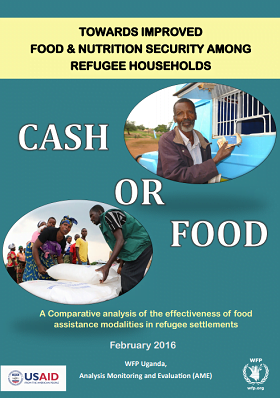
Cash or Food A Comparative analysis of the effectiveness of food assistance modalities in refugee settlements
Report
A comparative analysis on the effective of food and cash transfer modalities for household food security in refugee settlements in Uganda.

Using Cash for Shelter: An Overview of CRS Programs
Report
Cash continues to gain prevalence as a modality for humanitarian agencies to help people meet multiple and diverse needs in the wake of a crisis. It provides people with the dignity of choice, and is often significantly more cost-efficient than the delivery of in-kind aid. In programs with a shelter...
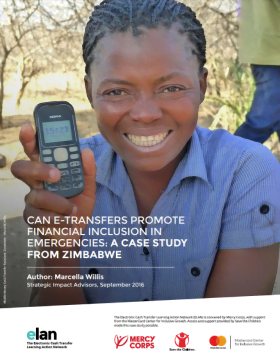
Can E-Transfers Promote Financial Inclusion in Emergencies: A Case Study from Zimbabwe
Case Study
The Electronic Cash Transfer Learning Action Network (ELAN) launched research to build an evidence base around connecting emergency electronic transfer (e-transfer) recipients with additional financial services. They wanted to learn if, when, and how e-transfers can promote sustained uptake and use...
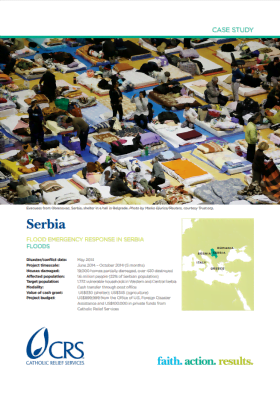
Using Cash for Shelter: Flood Emergency Response in Serbia
Case Study
The devastating floods that affected the Balkans in May 2014 affected 1.6 million people, 22 percent of Serbia’s population, and have set the country’s economic development back decades. Catholic Relief Services (CRS) conducted rapid assessments in 13 villages in the municipalities of Šabac, Valjevo,...
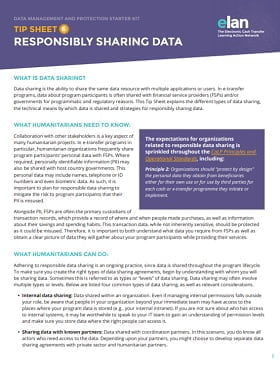
Data management and protection starter kit: Tip sheet 6: Responsibly Sharing Data
Guidelines and Tools
Data sharing is the ability to share the same data resource with multiple applications or users. In e-transfer programs, data about program participants is often shared with financial service providers (FSPs) and/or
governments for programmatic and regulatory reasons. This Tip Sheet explains the different...

Evaluation of the Kenya Hunger Safety Net Programme Phase 2: Drought Emergency Scale-up Payments Process Review – Final report
Report
This report presents findings from the process review of the Hunger and Safety Net Programme (HSNP) drought emergency scale-up payments, commissioned under the independent evaluation of the HSNP. The review provides an independent account of stakeholders’ experiences in the implementation of the first...
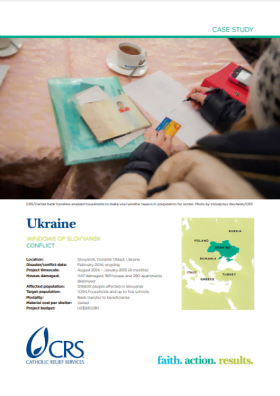
Using Cash for Shelter: Windows of Slovyansk
Case Study
After pro-Russian separatists declared republics in Eastern Ukraine in April 2014, Slovyansk became a focal point of fighting between government forces and rebels until the Ukrainian military retook the city in early July. Slovyansk saw the heaviest fighting of any urban area and many city dwellers fled....
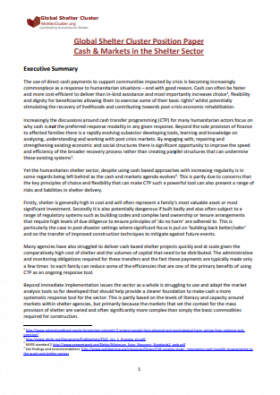
Global Shelter Cluster Position Paper: Cash & Markets in the Shelter Sector
Presentation
The use of direct cash payments to support communities impacted by crisis is becoming increasingly commonplace as a response to humanitarian situations – and with good reason. Cash can often be faster and more cost-efficient to deliver than in-kind assistance and most importantly increases choice,...
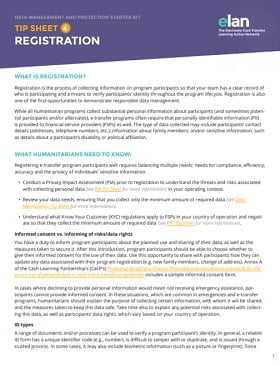
Data management and protection starter kit: Tip sheet 4: Registration
Guidelines and Tools
Registration is the process of collecting information on program participants so that your team has a clear record of who is participating and a means to verify participants’ identity throughout the program lifecycle. Registration is also one of the first opportunities to demonstrate responsible data...

Economic Impact of Refugee settlements in Uganda
Report
Uganda is home to close to 800,000 refugees, mostly from South Sudan, Burundi and the Democratic Republic of Congo. It also has one of the most favorable and progressive refugee assistance programs in the world, with freedom of movement, work rights, and land officially set aside for refugees to...
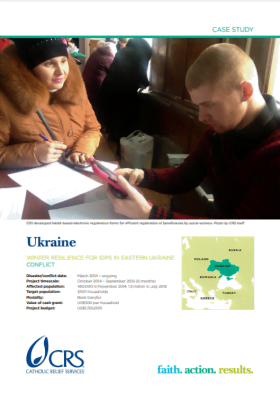
Using Cash for Shelter: Winter Resilience for IDPs in Eastern Ukraine
Case Study
Continued conflict in Eastern Ukraine during 2014 caused internal displacement of over 1.46 million people by September 2015, and another 1,123,800 fled to other countries, according to the United Nations High Commissioner for Refugees. Rapid assessments carried out by Catholic Relief Services found that...
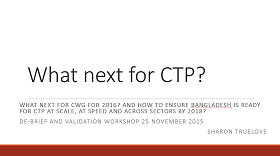
What next for CTP?
Report
What next for CWG for 2016? and how to Ensure bangladesh is ready for CTP at scale, at speed and across sectors by 2018? De-Brief and validation Workshop 25 November 2015

Research: Refugees Can Bolster a Region’s Economy
Report
The world’s refugee population has increased sharply in recent years, leading governments to argue over which countries should take in people displaced by war or other calamities. At the core of this debate is cost: refugees are usually considered an economic burden for the countries that take...
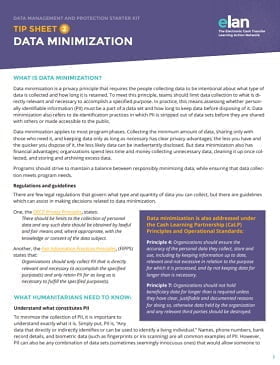
Data management and protection starter kit: Tip sheet 2: Data minimization
Guidelines and Tools
Data minimization is a privacy principle that requires the people collecting data to be intentional about what type of data is collected and how long it is retained. To meet this principle, teams should limit data collection to what is directly relevant and necessary to accomplish a specified purpose. In...

Scale Right: Coordinating Improved Cash Assistance in Greece
Report
Europe is still reeling from the largest refugee crisis it has experienced since World War II. During the first half of 2015 Greece saw an average of 3,000 refugees arriving daily by sea onto the island of Lesvos. While the number of new arrivals—fleeing war in Syria, conflicts in Iraq, Afghanistan and...

Rapid Assessment for Markets: Bidibidi Refugee Settlement
Report
The Rapid Assessment of Markets (RAM) conducted within the Bidibidi Refugee Settlement and in the surrounding Ugandan towns and trading centres sheds some light upon the rapidly developing network of marketplaces within one of the world’s fastest growing refugee settlements. The RAM highligthed key...

Using Cash for Shelter: Rent Assistance for Syrian Refugees
Case Study
Over 600,000 Syrian refugees have arrived in Jordan since 2011; 80 percent of these live in urban or peri-urban locations rather than in camp settings. Families in this situation must pay rent for their shelter, and are therefore subject to shifts in rental market values. Rents have inflated substantially...

Intra-Household Dynamics and the Design of Social Protection Programs: The Case of Polygamous Households in North Burkina Faso
Case Study
A recent overview of World Bank social safety net programs and gender highlighted the need for greater consideration of intra-household dynamics in the design of social protection programs (Bardasi 2014). During program design, decisions have to be made about who to target, how much and how often to give...